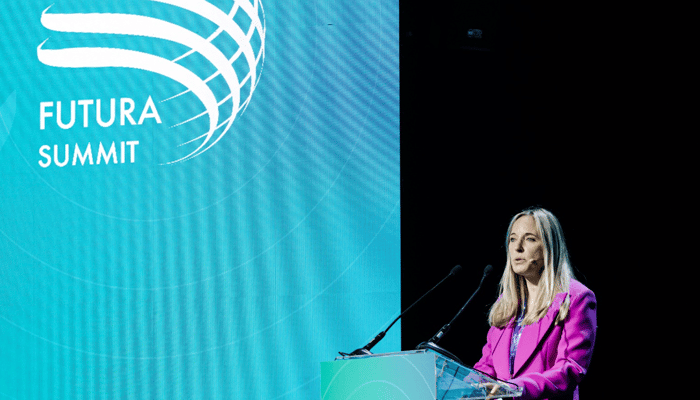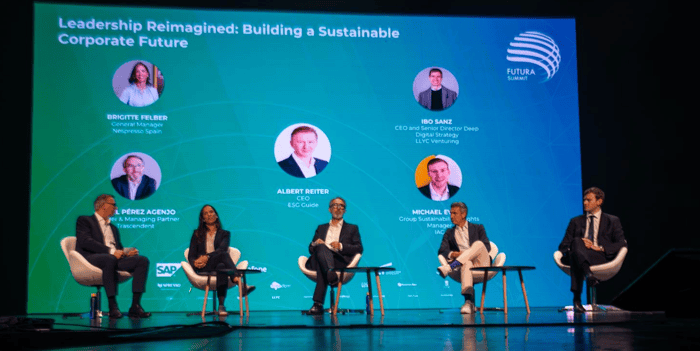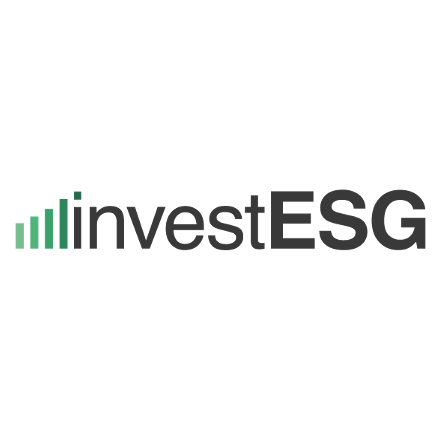Call to action: to turn commitments and rhetoric into tangible impact - ESG.Guide moderated leadership panel


Photo credit: FUTURA Summit (ESG Summit Euorpe)
Mónica Rico, founder of FUTURA Summit
- The summit (formerly ESG Summit Europe) brought together international leaders and companies in Madrid to redefine corporate sustainability through action, innovation, and measurable impact.
- More than 600 attendees and 40 speakers agreed: it is time to move from commitments to real impact.
- The live IMPACT Pitch competition awarded D3 Companion for its data-driven architectural design platform, which reduces energy use and emissions from the concept phase.
FUTURA Summit (formerly ESG Summit Europe), Europe’s leading forum on
sustainability, responsible leadership, and regenerative transformation, concluded with a unanimous
call to action: to turn commitments and rhetoric into tangible impact, ushering in a new era of business
action and purpose. Held in Madrid on 7–8 October, the event gathered more than 600 participants and
40 experts.
“FUTURA reflects our determination to focus on what truly matters: building the future. It stands for
action, innovation, and lasting results,” said Mónica Rico, founder of FUTURA Summit, on the evolution
of the summit’s name as it reached its third edition—a symbolic and practical transition that left a clear
message: the sustainability of the future will be regenerative, measurable, and profoundly human.
The official opening was led by María Jesús Romero de Ávila, Director General for Economy at Madrid
City Council, who highlighted the city’s commitment to innovation, sustainability, and promoting a green
economy that combines growth with purpose.
The future is not something we wait for - it is something we design
The inaugural session, featuring John Elkington (Volans) and Marga Hoek (Business for Good), set the
tone with a call to embrace complexity and redesign entire systems, going beyond incremental change.
“The future is not something we wait for; it is something we design,” said Elkington, while Hoek
emphasised that technology and the circular economy are key to achieving sustainable energy
independence and that Europe must embrace radical transformations, not marginal adjustments.
Both
underlined the role of new generations as drivers of change, noting that the next 15 years will bring
more transformation than the past 50.
ESG.Guide: Panel on Leadership Reimagined - Building a Sustainable Corporate Future
In the conversation on new leadership, Albert Reiter, CEO and Founder of ESG.Guide and investRFP moderated a panel featuring Brigitte Felber (Nespresso), Ángel Pérez Agenjo (Trascendent),
Michael Evans (IAG), and Ibo Sanz (LLYC).
Sustainability is no longer about reputation but a
competitive advantage and a governance principle, where communication must be rooted in facts, not
abstract concepts. “Without action, storytelling is meaningless,” said Sanz. "Technology will be the focus of future investment", concluded Albert Reiter who referred to previous trends in asset management before sustainability regulation changed the business landscape in sustainability.

Regulatory Update from EU, EFRAG, ISSB and Eurosif
The European ESG disclosure panel brought together representatives from the European Commission,
EFRAG, ISSB, and Eurosif, who discussed evolving standards towards simpler, auditable, and impact-
oriented models.
They agreed on the need for simplification and harmonisation of ESG reporting
regulations and stressed that transparency only holds value when it translates into verifiable results.
Voluntary reporting, they noted, will continue to be a strategic tool to strengthen investor and consumer
trust.
Elena Arveras (European Commission) argued that “we need a competitive economy for sustainability
to thrive,” while Chiara del Prete (EFRAG) stated that the goal is “to simplify regulation and allow
companies to focus on creating sustainability, not just reporting it.”
Jennifer Bofinger-Schuster (ISSB) highlighted the need to harmonise global frameworks to ensure
comparable data, while Aleksandra Palinska (Eurosif) called for regulatory stability to reinforce investor
confidence.
According to Clara Arpa, President of the UN Global Compact Spain, in an unstable global context,
“sustainability becomes the best strategy for navigating complexity, because sustainability is a core
element of risk management.”
It is all about the "S" in ESG
In her keynote, Aline Gómez-Acebo Finat (Eniax, Asisa) underscored the essential role of the social
pillar: “The ‘S’ in ESG is not philanthropy; it is business strategy with measurable impact.”
She urged
organisations to place people at the centre of decision-making as a way to enhance productivity, loyalty,
and innovation, and called for Europe to align social indicators with environmental and governance ones,
stressing that social outcomes also generate economic and competitive value.
Sustainable finance, innovation, and circularity as drivers of transformation
The sustainable finance panel, moderated by Andrea González (Spainsif), showed how Europe is leading
the transition towards responsible investment amid global uncertainty.
Pablo Hernández (CaixaBank),
Eduardo Brunet (Green Finance Institute), and Jan Herrmann (Osborne Clarke) stressed the importance
of coherent regulation, patient capital, and shared metrics to channel investment towards green
transition and climate resilience projects.
Discussing sustainable investment strategies, Pablo Hernández (CaixaBank) noted a major opportunity
in the green transition, focusing on exclusion and restriction criteria that inherently avoid working with
sectors not aligned with sustainability principles.
Circularity and product intelligence were also key themes. In a panel moderated by Juan Aguiriano
(Kerry), Iván Moya (UNE), David Romero (Siemens Gamesa), Cristina Sánchez (Leroy Merlin Spain),
and Adolfo Cancelo (SURUS) presented successful examples of traceability, digital material passports,
and life cycle assessment (LCA), demonstrating that transparency becomes action when embedded in
industrial design and supply chains.
Cristina Sánchez also pointed to the need to prepare for the
Sustainable Consumption Law and to advance circular models in retail.
Technology and artificial intelligence: from reporting to tangible impact
Artificial intelligence and digitalisation emerged as major accelerators of corporate sustainability.
Stephen Jamieson (SAP) presented the concept of the “Green Ledger”, a system integrating carbon
accounting into corporate finance to manage emissions with the same rigour as money—turning
sustainability from a reporting exercise into a dynamic management practice.
Ángel Agudo (Clarity AI) and Kyriakos Exadaktylos (Vodafone) showed how technology enables
automated ESG risk assessment, reduces compliance time, and optimises the energy efficiency of
networks and infrastructure. José Luis Blasco (Acciona) introduced the concept of a “Climate Economy”,
redirecting capital towards competitive, low-carbon alternatives.
Innovation also took centre stage in ECOALF’s success story, presented as an inspiring business model.
Its founder, Javier Goyeneche, remarked: “How things are done matters more than what is done.” His
brand, based on transforming ocean waste into sustainable fashion, avoids the use of virgin resources
by relying on recycled and recyclable materials, with its ‘Upcycling the Oceans’ project involving over
4,000 fishermen in marine waste collection.
Impact entrepreneurship: from purpose to execution
The IMPACT Pitch Europe competition, hosted by Federico Garcea (Treedom), closed the event with
energy and tangible examples of transformative innovation. In a “Shark Tank” format, European startups
presented solutions for environmental and social impact.
The jury, Livia Orozco (Schneider Electric), Fernando Lelo de Larrea (Rumbo Ventures), and Nimisha S.
Sodha (Responsible Investment Expert), awarded Ayoub Larchi, CEO and co-founder of D3 Companion,
whose data-driven architectural design platform reduces energy use and emissions from the concept
stage. Runner-up projects XNatura (3Bee) and Re4Real focused on biodiversity and circular recycling.
“Europe needs more impact founders. The future is not declared; it is built,” Federico Garcea
emphasised.
Now in its third edition, and evolving from ESG Summit Europe to FUTURA Summit, the event featured
representatives from international institutions such as the European Commission, the UN Global
Compact Spain, EFRAG, ISSB, as well as organisations and companies including Eurosif, Spainsif, DIRSE,
SAP, Vodafone, EY, CaixaBank, LLYC, Leroy Merlin, ECOALF, Osborne Clarke, Trascendent, Presgo,
Treedom, and Nespresso.
Published by
 investESG
investESG
 investESG
investESG

